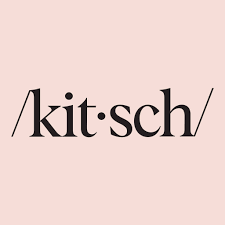Kitsch is more than just a company that sells beauty products.
When Kitsch’s founder, Cassandra Thurswell, left Wisconsin for Los Angeles more than 15 years ago, her dream wasn't to be an actress, like so many people who head to LA. Instead, she hoped to provide something that truly mattered to people: joy. She wanted to offer meaningful moments of self-care to people by creating small indulgences that anyone could enjoy.
Kitsch got its start with Thurswell selling hair ties door-to-door, and today, it is a world-renowned beauty and accessories brand known for high-quality, affordable products that blend style and function.
The company offers a diverse assortment of personal care items, from shampoos and conditioners to body bars, heatless curling iron sets, hair fragrances, pillowcases, and more. These products are found in more than 20,000 retail locations in 27 countries.
Kitsch products are sold both directly to consumers through the company's website and through online marketplaces such as Amazon. The products are also sold to major retailers, including Target, CVS, Kohl's, and Ulta.
With Kitsch distributing its product in so many different ways and places, the company faced a very complex sales tax situation. Unfortunately, it managed sales tax compliance obligations manually, a process that took hours and that introduced a significant risk of human error.
Managing sales tax in such a stressful way was not on brand for a company that aims to create “Kitsch moments,” or opportunities to refresh and reset through the use of beautiful, sustainable products. Kitsch needed a better way to handle its sales tax obligations quickly.
Manual processes create risk and cost time
Kitsch has long been focused on finding sustainable solutions for its product line, using eco-friendly materials in packaging and carefully sourced ingredients. However, the company's method of sales tax compliance was far from sustainable as the company grew into new markets.
Rami Darouiche, Kitsch’s controller, explained the company's fully manual process for sales tax compliance:
On the first day of each month, the company would pull its sales data from Shopify. The team in charge of this arduous task would spend between one and two hours at the start of each month collecting this data, a cumbersome process that required confirming they had the date filters correct.
After pulling the data manually, the company would certify it and then email it to a consulting company that helped with sales tax issues. The consulting company would review Kitsch's sales details and would prepare an invoice detailing the total amount that Kitsch owed in taxes. The invoice was then sent to Kitsch, listing the required amount to pay, including a consulting fee in addition to the sales tax amounts due.
Kitsch would send the funds to the consulting company to pay the taxes to different jurisdictions, and after collecting its fees, the consulting company would file Kitsch's sales tax returns and remit payment to the states accordingly.
Unfortunately, as Darouiche told Numeral, "human errors were likely" at multiple steps of this process.
For a company with a complex tax situation, this process was problematic, to say the least. Manually collecting data was not only time-consuming; it also significantly increased the risk of major mistakes that could lead to noncompliance and then to audits and potential penalties.
The reality is that Kitsch's tax situation is especially ill-suited to a manual process like this, as the company’s business model presents a few key challenges:
The company sells both to consumers and to businesses (resellers).
Resellers don't pay tax at the point of purchase, so other stores buying products from Kitsch to resell don’t need to pay sales tax on their transactions.
However, collecting a resale certificate from every reseller and keeping those certificates on file is critical for Kitsch in case of an audit.
For B2C (business to consumer) transactions, on the other hand, Kitsch needs to collect taxes directly from customers in jurisdictions where it has nexus (a physical or economic connection that creates a sales tax obligation). This money needs to be collected on all taxable sales at the point of sale and tracked carefully so payments can be made to the appropriate state and local revenue departments.
The company sells with marketplace sellers and on its own.
Kitsch sells its products on its website, as well as on Shopify and on marketplaces like Amazon. Marketplace facilitator laws require sites like Amazon to collect and remit taxes on behalf of their third-party resellers. Shopify, however, is not a marketplace facilitator.
Companies in this situation must know which of their sales channels are run by marketplace facilitators who collect and remit taxes on their behalf, and which aren't. In addition, in some states, items sold through a marketplace facilitator count when determining whether a company meets economic nexus requirements; in other states, they don’t.
Knowing the rules and monitoring which sales Kitsch is responsible for collecting and paying sales tax for is both extremely important and potentially quite confusing.
Kitsch sells throughout the U.S. and around the world.
Kitsch sells products in 27 foreign countries and in the United States.
So the company is responsible for not only following the tax laws in every U.S. state where the company has nexus (and additional local jurisdictions within many of those states), but also complying with tax rules in other countries where its products are purchased.
Kitsch needed a partner that understood all the complex requirements that impact a company that has a global presence. Kitsch found that partner in Numeral, which can manage sales tax compliance in more than 55 countries, and which excels at simplifying sales tax compliance in exactly the type of complex situations Kitsch is facing.
Automating compliance and avoiding costly errors
Kitsch is a forward-thinking company, and it wanted a forward-thinking solution for sales tax compliance.
"At Kitsch, we are focusing on streamlining operations by leveraging automation and reducing manual processes across our workflows," Darouiche said.
This meant no more manual collection and compilation of data. Instead, Darouiche reached out to industry peers for advice on how Kitsch could automate this burdensome task — and that led him to Numeral.
"We chose Numeral based on strong recommendations from industry peers and because their pricing structure aligns well with our company’s budget," Darouiche said.
With three pricing tiers, including a full-featured free plan that includes nexus monitoring and integrations with apps including Shopify, a standard plan priced at $75 per filing and $150 per registration, and a customizable pro plan tailored to the needs of larger companies, Numeral offers the easy-to-understand, affordable pricing that Kitsch was looking for.
Numeral was also able to offer the solutions that Kitsch needed for its complex tax situation, with support for cross-border transactions and for a sales model that involves many channels subject to differing tax rules.
Numeral’s impact
Numeral jumped in to get Kitsch onboarded quickly, since the manual collection process was taking time away from other business goals and putting the company at risk.
The ease and simplicity of getting started with Numeral drew praise from Darouiche. And the switch brought immediate benefits.
After onboarding, Kitsch was able to fully turn over sales tax compliance to Numeral, putting an end to manual reconciliation. Numeral is integrated with Shopify, which is the platform that Kitsch was using, so collecting transaction data for sales on the platform was simple and automatic.
Numeral is now filing and remitting taxes on Kitsch's behalf, saving the team countless hours and reducing the risk of filing mistakes. And Numeral offers Kitsch a host of other features that help make sales tax compliance effortless, including monitoring when the company reaches nexus in a new market and even processing and responding to sales-tax-related correspondence from local and state governments.
Now, the team at Kitsch can spend just minutes each month on sales tax compliance instead of hours. With Numeral taking care of tasks like collecting and storing reseller certificates and monitoring transactions both on and off of marketplaces, Kitsch can focus on making beautiful products — instead of on the complicated sales tax issues.
"Our advice to other companies is to strongly consider leveraging automation tools as soon as possible," Darouiche said. "As the business scales, manual processes become increasingly error-prone, time-consuming, and difficult to maintain. The Numeral team is responsive and has ensured a smooth and seamless experience. We're very excited to be leveraging their automation tools to allow our team to focus on value-added tasks."
Now, the company's employees have more time to create those “Kitsch moments”, not only for their customers, but also for themselves, because they no longer have to deal with the stress of sales tax compliance.





